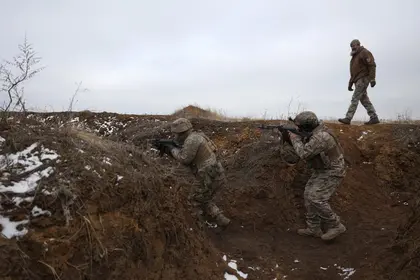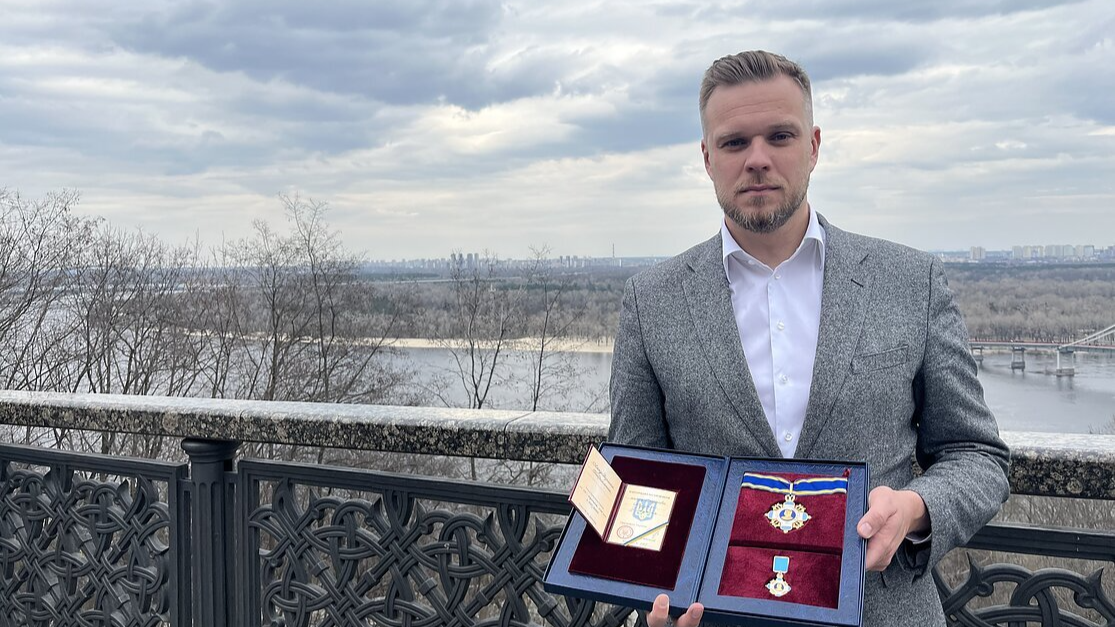Overview:
- US says Kremlin is just trying to create divisiveness with leaked German video
- Air Force tells the “orcs” where they can go, sending message with a guided bomb
- Canada will ship thousands of missiles for Ukraine, as soon as safe transport secured
- Russian forces keep focus on key villages of Orlivka and Tonenke
- Storm V is the new Storm Z
White House says leaked German footage is simply fodder for Kremlin spin doctors
JOIN US ON TELEGRAM
Follow our coverage of the war on the @Kyivpost_official.
US administration officials on Monday brushed off the recently leaked video of German military brass discussing the war in Ukraine as a “bald attempt” by the Kremlin to try to create divisions among Kyiv’s allies, AFP reported.
“This is a bald attempt and a transparent attempt by the Russians,” said White House National Security Council spokesperson John Kirby, “to try to sow discord and to try to show division, to try to make it look like the West isn't unified.”
Germany said it will investigate the leaking of the video conversation, which walked through the possible delivery of Taurus missiles to Kyiv, as well as the potential targeting of the Kerch Bridge. The discussions were later posted online by the head of Russian state media channel RT.
Germany's ambassador, getting doorstopped by Russian state media as he gets called into the Foreign Ministry to be tongue-lashed over this leaked audio (in which German generals discuss, over unencrypted phone lines, the use of Taurus missiles in Ukraine...) pic.twitter.com/ZHgcR9nwZt
— Mike Eckel (@Mike_Eckel) March 4, 2024
“For the Children of Odesa”: Air Force posts video of payback on Russian target in Kherson
The Ukrainian Armed Forces (AFU) posted a video on Monday of one of its guided aerial bomb strikes on an unspecified target in occupied Kherson.
Ukrainian Air Force Lt. Gen. Mykola Oleshchuk on Facebook added the caption “March 4, 2024. The occupied Kherson region. Hitting an enemy target with a guided aerial bomb. Burn in hell, orcs!”
He also thanked the pilots for their daring mission.
Superimposed on the video was an image of a bomb (perhaps used in the attack), which was decorated with the handwritten message “For the Children of Odesa.” The strike came just days after a Russian drone strike leveled an apartment building in Odesa, killing at least five young children, including infants.

What if Russia Wins?
Ottawa says air-to-ground missiles should be ready in the coming days
Canadian Defense Minister Bill Blair said at a press conference on Monday, state media Ukrinform reported, that Ottawa is readying many of their 83,300 decommissioned CRV7 rockets for shipment to Ukraine.
“We are doing the work right now to make sure that those munitions can be safely transported. Once that has been determined, and that should only be a matter of days, we will move as quickly as possible to get all of that resource to Ukraine,” Blair said.
Canada has on hand a reported 83,330 of the rockets, although not all of them have warheads attached.
The powerful but older-generation missiles were taken out of use by the Canadians about 20 years ago, and have been kept in stockpiles since. Short for Canadian Rocket Vehicle 7, the Winnipeg-made munitions were considered the most powerful air-to-ground weapons in their class, designed to bust Russian hangars and their aircraft.
Blair said, “There are a number of those rockets that are still usable, and there are a number of motors that come on those rockets, which the Ukrainians in my meeting with them last weekend have indicated that they could use.”
The Canadian parliament has called for the speedy transfer of all CRV7 missiles in the Canadian Armed Forces to Ukraine. Canada has a surplus of ~83.000 CRV7 missiles that are due to be decommissioned.https://t.co/NbYo8dhL6J
— NOELREPORTS 🇪🇺 🇺🇦 (@NOELreports) March 4, 2024
Operations: Donetsk region
The Institute for the Study of War (ISW) reported that Moscow’s forces advanced west of Avdiivka again on Monday, inching in closer on two of a trio of Donetsk villages that are being closely watched by both sides.
Geolocated footage published Monday shows the invaders moving forward along the same windbreak south of Orlivka, near the Orlivka-Tonenke road, that they have been occupying for days now. A Russian military blogger also claimed on Sunday that Russian forces advanced up to 450 meters deep in the sector of Tonenke, while another made unconfirmed claims that troops have captured most of the settlement, but that Ukrainian forces still maintain positions in northwestern Tonenke.
Meanwhile, just southwest of the city of Donetsk, geolocated footage posted Monday seems to show that elements of the Russian 155th Naval Infantry Brigade (Pacific Fleet) advanced into central Novomykhailivka, the ISW reported.
"Possibly the location of a Russian flag raised in Novomykhailivka"
— AMK Mapping 🇺🇦🇳🇿 (@AMK_Mapping_) March 4, 2024
47.854866, 37.487827
location: Novomykhailivka, Donetsk oblast, Ukraine
Source: https://t.co/7WcAuwHFZQ@GeoConfirmed @UAControlMap
Russian forces also made confirmed advances west of Bakhmut, the think tank reported, citing geolocated footage from Sunday. It appears to confirm that Russian troops have made it into central Ivanivske (west of Bakhmut). The analysts noted that fighting is ongoing in western parts of town and that Russian forces are “attempting to cut Ukrainian logistics lines that run into Ivanivske from the north.”
Geolocation of 3 abandoned/damaged vehicles inside Ivanivske. A visible white Z indicates, that the location is under Russian control.
— German_Observer (@GermanObserver1) March 4, 2024
4:23
⚫️ Abandoned BTR 48.577569, 37.923698
🟢Damaged MT-LB 48.577610, 37.923569
🟤Abandoned AFV 48.577598, 37.923582@GeoConfirmed @UAControlMap pic.twitter.com/2YFe5yBbpz
Russia dilutes prisoner-only military units to half-and-half mixture with non-criminals
Just when it seemed like being a Russian prisoner sent to the slaughter in Ukraine was a ray of sunshine, the Kremlin changes all the rules.
ISW analysts noted that a Russian news aggregator claimed Monday that Moscow has been replacing Storm-Z convict units with Storm-V units, “a mechanism for distributing convicts into the regular Russian military as opposed to keeping them siloed within convict-only units, as was the case with Storm-Z formations.”
The introduction of the “Storm-V project” will in theory eliminate “the legal grey areas that Storm-Z convicts had to navigate to receive official pardons for their crimes,” analysts explained. The bad news for the prisoners is that, by serving in the Storm-V project rather than Storm-Z, in order to receive a government pardon for their crimes, they are now expected to serve in the military for longer than six months, as was the original agreement.
You can also highlight the text and press Ctrl + Enter









